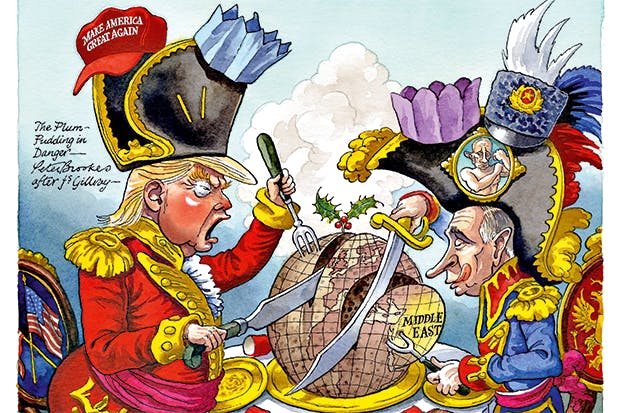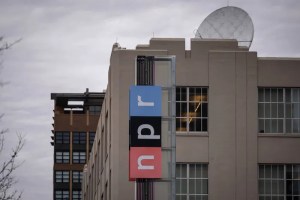If any other president than Donald Trump had announced the withdrawal of American troops from Syria, he would be lauded for a strategic wisdom rare among American presidents, and for that even rarer achievement, fulfilling a campaign promise. Instead, he is attacked by Democrats and Republicans alike. That alone suggest that he is doing something right.
The truth is, American foreign policy experts have been consistently wrong about the Middle East for decades. Who, apart from the culprits of George W. Bush’s wars, seriously believes that Iraq ever was a nation, rather than a cobbled-together state? Who, apart from the apologists of Obama’s appeasement, seriously believes that Iran has no ambitions as a nuclear-tipped empire? Who, apart from the State Department and every alleged expert when asked, believes that the Israelis and Palestinians are perpetually on the verge of a two-state solution?
The experts are very clever, impeccably qualified, and consistently wrong. The media repeats what the experts say because it has no long-term memory and they are a source of instant copy. Meanwhile, what is the purpose of having 2,000 American troops in northeastern Syria?
If the purpose is fighting ISIS, this can be done by Turkey. Erdogan’s government may have fueled the Syrian disaster by allowing its southern border to become an entry point for foreign jihadists, but this is not relevant to the current position. The Syrian civil war is staggering to a murderous close. The carve-up is now under way. The United States missed its seat at the Syrian table under Obama. Erdogan is said to have assured Trump that he will expunge ISIS from northeastern Syria. Time to talk turkey with Turkey.
If the purpose is containing Iran, and preventing Iran from building a ‘land bridge’ between the Gulf and the Mediterranean, then this can be done in three ways. The first is to build up a Kurdish quasi-state in northeastern Syria, which is what the American troops are currently doing. This sets the US and Turkey on a collision course in northeastern Syria. Turkey has learnt to live with the Kurdish quasi-state of northern Iraq on its southwestern border. Twice would look like carelessness, and weakness. And the moment at which a Syrian Kurdish state could have broken away has passed. Again, it’s time to talk turkey with Turkey.
The second is to support Israel in what it is already doing. The Israelis are pushing back Iran from their borders by attacking Iranian assets in western Syria and Iranian shipments into Lebanon. The IDF is currently blowing up Hezbollah’s tunnels into northern Israel — tunnels dug with the complicity of the US-supported Lebanese army and the constructive blindness of UNIFIL observers. The timing of the tunnels’ exposure — Israeli ministers have admitted that they knew about the tunnels for a while — suggests a co-ordinated push against Iranian influence.
The third is to do what Trump is now doing: a regional strategy that supports the Israeli campaign against Iran in western Syria and its proxies in Lebanon, and supports a Turkish campaign against ISIS in northeastern Syria that carries the dividend of blocking Iranian and Russian ambitions in Syria. Trump’s domestic critics are treating his Turkish carve-up as a whim. But, looked at this way, this is joined-up thinking. And, for what a tweet is worth, Trump claims to have a ‘slow & highly co-ordinated’ withdrawal in mind.
If Erdogan can be trusted, then a Turkish campaign in northern Syria will mop up ISIS. It will block the Iranian land bridge. It will impede Putin’s efforts to use Syria as the pivot for Russia’s return to regional dominance. It might even pull Turkey away from its historic enemy Russia, with whom Erdogan has been alarmingly friendly lately, and towards the American-sponsored anti-Iran axis of Sunni states plus Israel, whose forces will be checking Iran in western Syria and Lebanon. It strikes a strategic bargain with Erdogan’s neo-Ottoman ambitions; a game that worked well enough for the British and French in the 19th century. And all without costing American lives.
The collateral costs are relatively low for Israel, which is capable of fighting its corner, but high for the Kurds in Syria. The Trump-Erdogan ‘co-ordination’ seems to involve a Turkish gesture to the Kurds in Syria; the Turkish army is believed to have suspended a planned campaign against the YPG militia east of the Euphrates in northeastern Syria. Much now depends on the political format of the Syrian puppet state.
Time to talk turkey on Syria, with Turkey and Russia. In a Syrian federation, a Kurdish zone under Turkish patronage would be less than the Syrian Kurds want — and less than they deserve after fighting so hard against ISIS. But it might be enough for Turkey and the Syrian Kurds to tolerate. It would be enough to block the Iranian land bridge. It would also be a setback for Putin’s campaign to bring all of post-civil war Syria under Russian control. If this looks like a sort of peace for Syria, it would also be a hardening of lines against Iran. The price of this peace will be allowing Putin to keep Assad in power.
This is what great powers are supposed to do: stabilize a chaotic region by getting their allies to do the work, and putting interests ahead of friends. Trump inherited a Middle Eastern turkey. He is carving it up as best he can. And do the chickenhawks have any better ideas?
Dominic Green is Life & Arts Editor of Spectator USA.


















